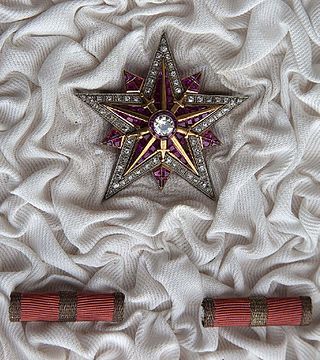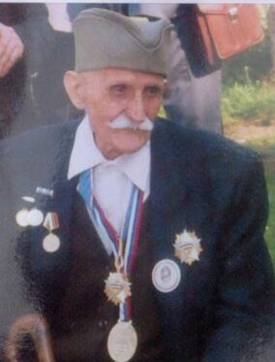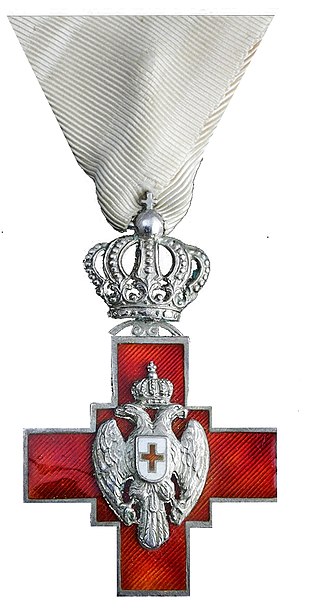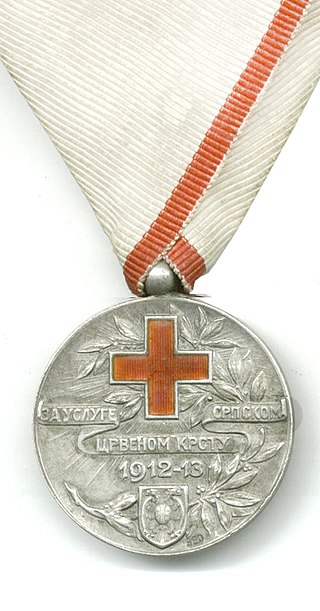
Alexander, Crown Prince of Yugoslavia, is the head of the House of Karađorđević, the former royal house of the defunct Kingdom of Yugoslavia and its predecessor the Kingdom of Serbia. Alexander is the only child of King Peter II and his wife, Princess Alexandra of Greece and Denmark. He held the position of crown prince in the Democratic Federal Yugoslavia for the first four-and-a-half months of his life, until the declaration of the Federal People's Republic of Yugoslavia later in November 1945, when the monarchy was abolished. In public he claims the crowned royal title of "Alexander II Karadjordjevic" as a pretender to the throne.

The Order of the White Eagle was a state order in the Kingdom of Serbia (1883–1918) and the Kingdom of Yugoslavia (1918–1945).

The Order of Karađorđe's Star is the third highest state order of Serbia. The order is awarded by the decree of the President of the Republic on special occasions, typically at the ceremonies held on the Statehood Day. It is awarded for special merits and successes in representing Serbia and its citizens. It can be awarded to individuals and institutions.

The orders, decorations, and medals of the Kingdom, Republic, and State of Hawaiʻi include knighthoods, orders of merit and precedence, and military awards and decorations.

The Order of St. Sava is an ecclesiastic decoration conferred by the Serbian Orthodox Church and a dynastic order presented by the House of Karađorđević. It was previously a state order awarded by both the Kingdom of Serbia and the Kingdom of Serbs, Croats and Slovenes/Kingdom of Yugoslavia.

Orders, decorations, and medals of the Socialist Federal Republic of Yugoslavia were created during the Second World War and used throughout the existence of the Socialist Federal Republic of Yugoslavia. The first decorations were created by AVNOJ on August 15, 1943 and included the Order of the People's Hero, Order of the People's Liberation, Order of the Partisan Star, Order of the Brotherhood and Unity, Order for Bravery and Medal for Bravery. By 1960 the total number of decorations increased to 42 and consisted of 35 orders, 6 medals and 1 commemorative medal. The designers of the Yugoslav orders and medals were Antun Augustinčić and Đorđe Andrejević Kun.
This page list topics related to Croatia.
Orders and medals were awarded in the Federal Republic of Yugoslavia between 1998 and 2006. Before the 1992 Breakup of Yugoslavia, the Orders and medals of the Socialist Federal Republic of Yugoslavia were awarded. Some of the old pre-1992 SFRY orders and medals were retained by FR Yugoslavia, while some new were established. Orders and medals of FR Yugoslavia were regulated by the Law on Decorations of Federal Republic of Yugoslavia adopted on 4 December 1998. Between 1992 and 1998, no decorations were awarded in FR Yugoslavia.

The Order of Carol I was the highest ranking of the Romanian honours of the Kingdom of Romania until the founding of the Order of Michael the Brave in 1916 by King Ferdinand I of Romania. It was instituted on 10 May 1906 by King Carol I to celebrate the Ruby Jubilee of 40 years of his reign.

Order of Freedom was the highest military decoration awarded in Yugoslavia, and the second highest Yugoslav state decoration after the Yugoslav Great Star. It was awarded to the commanders of large military units for skillful leadership and for the outstanding courage of the troops. It was awarded to both Yugoslavian and foreign military commanders, and was the most rarely awarded of all Yugoslavian orders, decorations, and medals, being awarded only 7 times before the breakup of Yugoslavia.
State decorations of the Republic of Serbia are regulated by the 2009 Law on Decorations.
The Medal for Bravery "Miloš Obilić", commonly known as the Medal of Miloš Obilić, is a state decoration awarded by the Republic of Serbia, and before that by the Kingdom of Serbia and the Kingdom of Yugoslavia, for heroic acts.

Commemorative Medal for Loyalty to the Fatherland 1915 or Commemorative Medal of the Great Serbian Retreat, better known as the Albanian Commemorative Medal was a single-classed military medal awarded to all Serbian military personnel who participated in the Great Serbian Retreat of World War I.

The Order of the War Banner was a military order of honor and the 7th highest state decoration of the both Socialist Federal Republic of Yugoslavia (SFRY) and Serbia and Montenegro. It was awarded to military commanders who show personal courage or self-sacrifice during the war.

Aleksa Radovanović was a Serbian soldier and the longest surviving veteran who fought in the Macedonian front theatre in World War I.
Vojvoda from old Serbian was the highest rank in the army of the Kingdom of Serbia and Kingdom of Yugoslavia from 1901 until end of Second World War in 1945. It has roots from the medieval term Voivode used during medieval Kingdom, Empire and Principality of Serbia. Vojvoda in medieval and later principality of Serbia had similar meaning as Duke title in other feudal states as it was military and noble title. In modern military terms the rank of Vojvoda is comparable with Field marshal and Generalfeldmarschall but since it can be an honorable title it is not always a military rank of a commissioned military officer.
State decorations of the Republic of Kosovo are regulated by the Law on Decorations. Decorations are divided into three grades: orders, medals and commemorative medals. The President also bestows the title of Honorary Ambassador of Kosovo to people who have made extraordinary contributions to the Republic of Kosovo. This is an honour bestowed very rarely with only nine recipients in the history of the Republic.

The Order of the Red Cross was a military decoration of the Kingdom of Serbia, Kingdom of Serbs, Croats and Slovenes and Kingdom of Yugoslavia. Established in 1876 and first awarded in 1877 by the Serbian Red Cross Society, it was awarded for exceptional care of the wounded and sick during war time. Decorations of the Serbian Red Cross Society had the rank of state decorations.

The Red Cross Medal of Merit was awarded to men and women, Serbian and foreign nationals, in two classes. Decorations of the Serbian Red Cross Society had the rank of state decorations.












